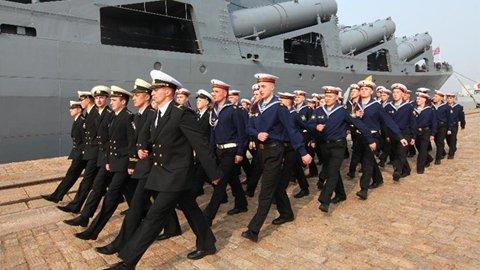 |
|
Russian Navy in a military exercise (Photo: Internet) |
Being a major power in the world, Russian Federation, for ages, has had its strategic interests in the Asia-Pacific region. Early in the 21st century, Russia engaged in Asia-Pacific’s fields more frequently and comprehensively in order to upgrade its status in this region.
According to international political analysts, Russia’s foreign policies are on the right track of the Asia-Pacific region’s vital issues, wielding considerable influence on this region manifested as follows:
Firstly, in economic cooperation, in spite of the fact that the global economic downturn has had a profound impact on a lot of countries and regions worldwide in recent years, the economic cooperation between Russia and Asia-Pacific countries has stably developed. China has left Germany behind to be Russia’s largest trade partner since 2012; over the past 2 years, Japan’s investment in Russia has reached nearly $ 10 billion; two-way trade turnover between Russia and ASEAN increased by 60% compared with that before 2011. Russia has also actively boosted the Asia-Pacific region’s economic connection, together with strengthening economic cooperation with each partner, in order to set a dynamic economic region that possesses a flexible cooperation mechanism and thus counterbalances other regions in the world. Russia became an APEC member in 1997 and promoted cooperation with strategic partners in the fields of its strength such as: energy, shipbuilding, mining… etc. That reflects Russia’s wish to integrate into ‘New Asia’ and helps create momentums for the country’s development, particularly for Siberia and Russian Far East.
Secondly, in military technical cooperation and arms export, Russia possesses its strength in this field and takes advantage over the Asia-Pacific region; that is considered the main foreign exchange revenue and an important measure to extend security influence and affirm its military power. As reported by Stockholm International Peace Research Institute(Sweden), in recent years, the Asia-Pacific countries have been Russia’s largest arms importers. Since 2011 onwards, more than 40% of arms imported by this region is from Russia; peculiarly India, nearly 50% of its imported arms is from Russia. It proves that Russia now has a considerable influence on the region’s security structures.
Thirdly, Russian engagement in the Asia-Pacific region’s ‘hot spots’ is unceasingly increasing. That generates strength to consolidate Eastern security, contain America, balance China, and prevent Japan. As assessed by international observers, throughout this engagement, Russia’s voice, role, and status increasingly becomes powerful and vital to the Asia-Pacific region’s security issues and the world’s as a whole. Moreover, Russia plays the key role in the Six-Party Talks on nuclear issues and denuclearization mechanism building in the Korean Peninsula, and Northeast Asia security mechanism construction. On the East Sea issues, Russia backs solutions to disputes in accordance with international law, particularly United Nations Convention on Law of the Sea (UNCLOS) 1982, not supporting America’s engagement in the East Sea and the East China Sea, at the same time attaching great importance to military exercises of its own and joint military exercises in the region to affirm its presence and strength. Typically, in July 2010, Russia held the military exercise named ‘Vostok 2010’ which involved nearly 20,000 troops, 70 warplanes, 30 warships, and 2,500 pieces of military hardware. Russia proactively participated in many joint exercises with India and China in sea and land; it also took part in the RIMPAC Exercise held by the U.S. in August, 2012. Notably, Russia has actively supported regional security mechanism construction and participated in regional security forums such as: ASEAN Regional Forum (ARF), Shangri-La Dialogue, ASEAN Defence Ministers’ Meeting Plus (ADMM +), and so on. Particularly, Russia continues maintaining strategic partnership with Vietnam, strengthens relations with Singapore, improves relations with India and makes use of Indian geopolitical edge. This is a strategic shift with a view to containing the Asia-Pacific region and India, gradually realizing Russian strategic objectives.
Thanh Lam